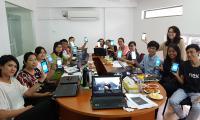“Human rights information can lead to change in Myanmar”

Women who are victims of domestic violence are frequent clients seeking legal advice via Facebook Messenger at the justice centres run by the NGO International Bridges to Justice Myanmar, where the lawyer Ma Kyi Suu and her colleagues are working. International Bridges to Justice Myanmar is an international NGO focusing on providing legal representation to marginalized people who are criminally accused in the justice system. Besides free direct representation at the justice centres and via social media such as Messenger, the Myanmar lawyers inform about basic legal rights and offer free legal services to low-income and marginalised people, including women and children.
Lately a mobile app called “A Khwint A Yay” (Our Rights)has enhanced the job of Ma Kyi Suu and many other lawyers as well as teachers and paralegals working to raise awareness of human rights across Myanmar. The mobile app provides free and easy access to nine core international human rights conventions and optional protocols in both Myanmar and English. It was launched by the Dagon and East Yangon universities in 2019. As part of the Denmark-Myanmar Programme on Rule of Law and Human Rights, the Embassy of Denmark and the Danish Institute for Human Rights have been working closely with Dagon and East Yangon Universities’ law departments since 2017. In 2020, a third partnership with University of Mandalay law department was established to support also their efforts in strengthening human rights education in Upper Myanmar. Facilitating the translation of the conventions and protocols into Myanmar is one of several outcomes of the programme.
Many lawyers know very little about human rights
Throughout the protracted military rule in Myanmar, human rights education was prohibited, people risked imprisonment when speaking about human rights, and freedom of expression was subjected to some of the harshest restrictions in the world.
According to Ma Kyi Suu the app is an important and very useful platform for promoting human rights in Myanmar.
“Many lawyers still know very little about human rights, their history and how to apply them. When for example we are dealing with a case of domestic violence, we don´t necessarily need to know the Convention on the Elimination of All Forms of Discrimination against Women (CEDAW) beforehand. In the app’s search box, we can simply type ‘domestic violence’ or another word related to the violence described by the women who seek our help, and then the relevant articles of the core conventions and protocols automatically pop up on our mobile phone,” Ma Kyi Suu says.
Thanks to the app, she and other lawyers can much more easily conclude whether a human rights violation has taken place according to international human rights law. ‘A Khwint A Yay’ also helps them examine whether domestic laws comply with international human rights standards.
Ma Kyi Thawtar and her colleagues also use the app during trainings of lawyers on labour rights and land rights and for example to examine whether the Child Rights Law, that the government enacted in 2019, complies with the Convention on the Rights of the Child.
Enforcement of human rights –still a long way to go
Myanmar has ratified six human rights conventions, however the development of national laws that comply with international standards and the enforcement of them are still has a very long way to go. Many people don´t know that they have the right to not be tortured or treated in an inhuman way and the right to a lawyer when they have been detained. Many children are unlawfully being held in police custody together with adults, Ma Kyi Suu experiences.
“We have met a lot of accused, who have been tortured in police custody and who are totally unaware of their legal rights and know almost nothing about the justice system,” Ma Kyi Suu says and further exemplifies the importance of raising awareness of human rights in Myanmar.
“When one of my friends was unfairly fired from her job as a nurse, neither her nor the entire groups of nurses in the hospital where she was working, knew about their legal rights, nor that they could seek help at a labour office. If even people with an education don´t know their rights, then imagine the many marginalised minorities without education, who don´t speak neither Myanmar nor English in our country,” Ma Kyi Suu says and refers to Myanmar’s Rohingya and other ethnic minorities, who are facing severe human rights violations and discrimination.
Against this background she thinks more should be done to reach the many Myanmar citizens who don´t read and write English and Myanmar. However, she is confident that the app is an important step towards increased promotion of human rights.
“If you don´t know you have rights that are protecting you, you are not even realising that your rights are being violated. “We cannot change anything in Myanmar, without information about human rights,” she says.

